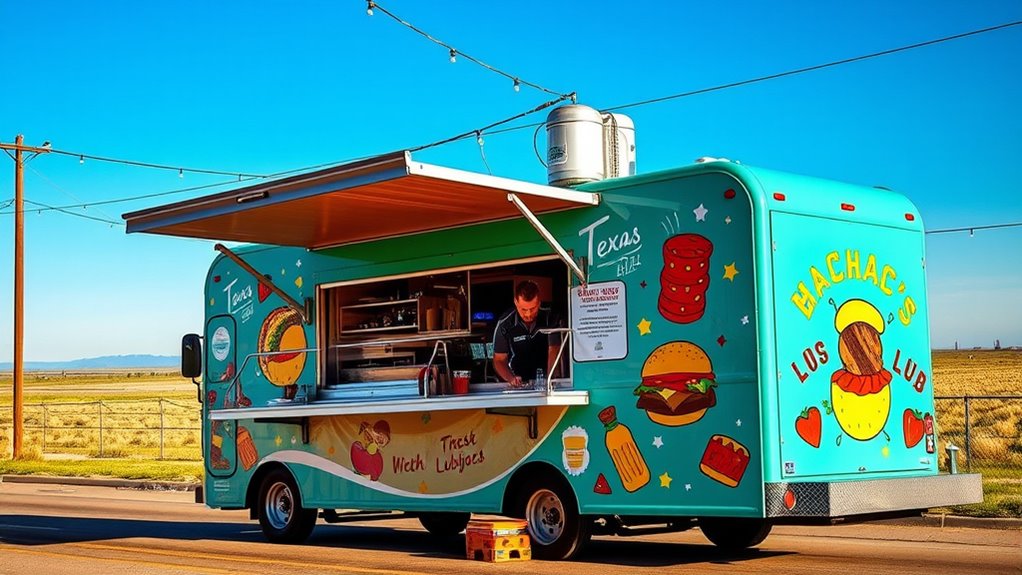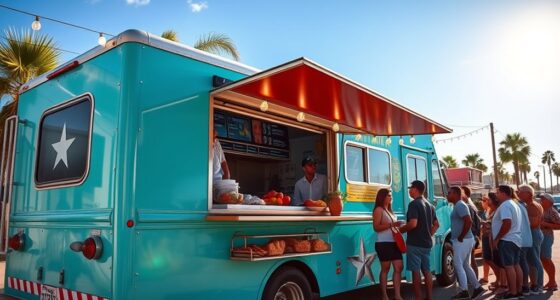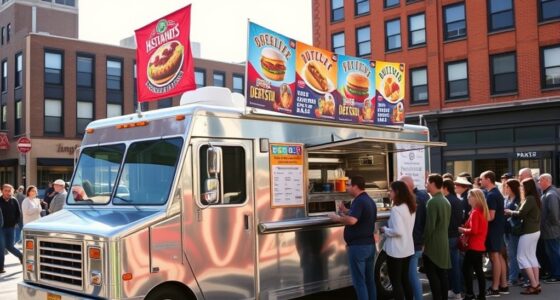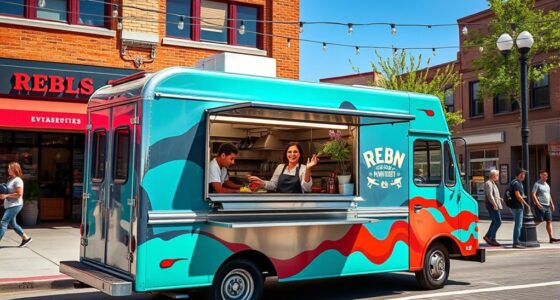Starting a food truck in Lubbock, TX, is an exciting opportunity as the industry grows rapidly and local demand increases. You’ll need to understand zoning rules, health permits, and license requirements, then plan your operations, budget, and insurance. Creating a catchy menu with local ingredients, building a strong brand, and engaging with the community are key to success. If you want to learn more about launching your food truck and making it thrive, keep exploring the essential steps that will help turn your idea into reality.
Key Takeaways
- Research local permitting, zoning, and health regulations specific to Lubbock for legal food truck operation.
- Develop a budget covering vehicle customization, permits, insurance, and initial inventory costs.
- Design a seasonal menu with locally sourced ingredients to attract customers and control costs.
- Establish a strong brand presence through social media, community engagement, and participation in local events.
- Secure financing options like small business loans and liability insurance to support startup costs and protect your investment.
Food Truck Industry Overview

The food truck industry has experienced rapid growth over the past decade, transforming from a niche market into a popular and dynamic segment of the culinary scene. Food truck innovation has played a key role in this expansion, as entrepreneurs continuously develop unique menus, creative concepts, and efficient operations. Industry trends show an increased focus on locally sourced ingredients, health-conscious options, and eco-friendly practices. This evolution allows you to stand out in a competitive market and attract diverse customer bases. As more cities embrace food trucks, opportunities grow for new ventures. Staying ahead of industry trends and embracing innovation can help you carve out a successful niche in Lubbock’s vibrant food scene. Emphasizing special occasion offerings and catering to seasonal events can further enhance your business prospects. Adaptability and fresh ideas are essential for long-term growth.
Understanding Local Requirements

To get started, you’ll want to check out the online permit application portals specific to Lubbock, making the process smoother. Keep in mind the health inspection checklist tips to guarantee your truck meets all hygiene standards. Additionally, familiarize yourself with designated food truck zones to avoid any location issues and stay compliant with local rules. Consulting local health and safety standards can further ensure your food truck operates smoothly and meets all necessary requirements.
Online Permit Application Portals
Navigating online permit application portals is essential for guaranteeing your food truck complies with local regulations in Lubbock. The permit portal provides a centralized platform where you can submit your online application, track progress, and receive updates. It simplifies the process by consolidating all required forms and documents, saving you time and reducing errors. When using the permit portal, ensure you review all instructions carefully and gather necessary information beforehand, such as proof of insurance and vehicle details. Many cities, including Lubbock, encourage digital submissions to streamline permitting. Familiarizing yourself with the online application process helps avoid delays and guarantees you meet deadlines. Using the permit portal effectively is a pivotal step toward launching your food truck legally and smoothly in Lubbock.
Health Inspection Checklist Tips
Understanding local health requirements is essential to passing your food truck’s health inspection in Lubbock. To meet inspection standards, focus on maintaining impeccable food safety practices and ensuring your truck is spotless. Familiarize yourself with specific local guidelines, as they can vary. Regularly review your checklist before inspections to identify potential issues.
Here are key tips to keep in mind:
- Keep food storage areas organized and at proper temperatures
- Sanitize all surfaces regularly
- Use gloves and proper hygiene practices
- Maintain clean, pest-free environments
- Document cleaning and maintenance routines
Adhering to these standards not only helps guarantee your food safety but also demonstrates your commitment to compliance, making the inspection process smoother and more successful.
Designated Food Truck Zones
Knowing where you can legally set up your food truck is essential for compliance and smooth operations in Lubbock. Food truck zoning laws designate specific areas where food trucks are allowed to operate, helping you avoid fines or shutdowns. You’ll need to familiarize yourself with local parking regulations, which specify the types of zones where you can park and serve customers. These zones may include designated event areas, parking lots, or street spots permitted for food trucks. Always check with city officials or local ordinances to identify approved locations. Staying within designated food truck zones ensures you’re following local rules, avoiding legal issues, and maintaining good community relations. Proper adherence to food truck zoning and parking regulations is key to building a successful business in Lubbock.
Setting Up Your Base of Operations

To establish your base of operations, you’ll need to understand shared kitchen licensing requirements in Lubbock and make sure your space meets all safety standards. Planning a custom kitchen layout is essential for efficient workflow and compliance. Taking these steps early helps you stay organized and ready to serve your customers smoothly. Additionally, considering local regulations and community preferences can help you tailor your menu and marketing strategies effectively. Halloween celebrations in different countries
Shared Kitchen Licensing Requirements
Setting up your food truck’s base of operations often involves obtaining a shared kitchen license, which guarantees your business complies with health and safety regulations. To do this, you must adhere to kitchen co-op regulations that ensure proper sanitation, equipment standards, and safety protocols. Understanding these requirements helps you avoid delays and legal issues.
Key points include:
- Meeting local health department standards
- Maintaining a clean and sanitized environment
- Registering with relevant health authorities
- Ensuring proper food storage and handling
- Keeping detailed records of operations
Custom Kitchen Layout Planning
Designing your food truck’s kitchen layout is a crucial step that directly impacts workflow efficiency and compliance with health regulations. You need to carefully plan the placement of kitchen equipment to ensure smooth layout flow, minimizing movement and reducing cross-contamination risks. Start by identifying essential appliances like ovens, fryers, refrigerators, and prep stations, then arrange them logically based on food prep sequence. Consider how staff will move through each task to avoid congestion and bottlenecks. Efficient layout flow not only speeds up service but also ensures safety and cleanliness. Keep frequently used items within easy reach and designate specific zones for prep, cooking, and cleaning. A well-thought-out kitchen layout maximizes productivity and keeps your operation compliant and safe.
Budgeting and Financing Your Food Truck

To get your food truck on the road, you’ll need to budget for initial vehicle customization costs and consider small business loan programs to cover expenses. It’s also essential to factor in liability coverage to protect your business and assets. Understanding these financial aspects helps set a solid foundation for your food truck venture. Additionally, exploring investment strategies in precious metals can provide insights into diversifying your financial portfolio for long-term stability.
Initial Vehicle Customization Costs
Budgeting for your food truck’s initial customization is vital because costs can vary widely based on your menu and equipment choices. You’ll need to take into account key expenses like a vehicle wrap to create eye-catching branding and custom shelving to maximize storage efficiency. These investments can greatly impact your startup costs but are essential for a professional look and functionality. Keep in mind:
- Quality vehicle wrap design and installation
- Durable custom shelving tailored to your menu
- Upgraded appliances for efficiency
- Exterior modifications for branding
- Interior lighting and electrical wiring
Balancing these costs with your budget ensures you get a functional, attractive truck without overspending. Proper planning at this stage helps you avoid surprises and sets a solid foundation for your food truck business.
Small Business Loan Programs
Securing funding for your food truck often requires exploring small business loan programs that can help cover startup costs and ongoing expenses. These financial assistance programs are designed to support entrepreneurs like you by providing access to capital with manageable terms. You can start by researching local lenders, such as community banks or credit unions, which often offer small business funding tailored to new ventures. Additionally, federal programs like the SBA 7(a) loan or microloan options may be available. Applying for these loans typically involves demonstrating your business plan, financial projections, and personal creditworthiness. By leveraging these small business funding sources, you’ll gain the necessary capital to purchase equipment, secure permits, and cover initial operating costs, setting a strong foundation for your food truck’s success.
Liability Coverage for Food Trucks
Since liability issues can quickly impact your food truck’s finances, including adequate liability coverage in your budget is vital. Insurance requirements for food trucks typically include liability coverage to protect against accidents, injuries, or property damage. Without proper coverage, you risk significant out-of-pocket expenses. To guarantee you’re prepared, consider these points:
- Understand local insurance requirements
- Budget for extensive liability coverage
- Choose coverage limits that match your operation size
- Regularly review policies for updates
- Include coverage for food spoilage and equipment damage
Having the right liability coverage not only meets legal requirements but also safeguards your investment, giving you peace of mind as you serve Lubbock’s vibrant food scene. Proper budgeting ensures you’re protected from unexpected liabilities that could otherwise threaten your business.
Designing Your Menu and Pricing Strategy

When designing your menu, focus on seasonal ingredients to keep costs down and freshness high. Balancing quality with pricing helps attract customers while maintaining profit margins. By optimizing your menu based on ingredient availability and cost control, you’ll create a strategic pricing approach that appeals to your target market. Additionally, understanding market trends can help you adjust your offerings to meet customer preferences and stay competitive.
Seasonal Ingredient Sourcing Strategies
To create a menu that resonates with your customers and maximizes profits, focus on sourcing seasonal ingredients that are at their peak freshness and affordability. Leveraging seasonal produce ensures you access the best ingredient availability, which can lower costs and enhance flavor. By aligning your menu with what’s in season, you can offer dishes that feel fresh and exciting. Keep these strategies in mind:
- Stay updated on local harvest schedules to anticipate ingredient availability
- Build relationships with local farmers and suppliers for reliable sourcing
- Adjust your menu periodically to reflect seasonal changes
- Use versatile ingredients that can be featured in multiple dishes
- Highlight seasonal items to attract customers seeking fresh, local options
This approach keeps your offerings fresh, cost-effective, and appealing year-round.
Cost Control and Menu Optimization
Effective cost control and strategic menu design are key to turning seasonal ingredients into a profitable and appealing food truck offering. By carefully pricing your menu items, you can maximize profit margins while keeping customers satisfied. Focus on menu diversification to appeal to a broader audience, but avoid overcomplicating your offerings, which can increase waste and costs. Use ingredient flexibility to adjust dishes based on seasonal availability, reducing expenses and improving freshness. Regularly analyze sales data to identify high-margin items and eliminate underperformers. Remember, a streamlined menu helps control costs, enhances efficiency, and boosts profit margins. Thoughtful pricing and menu planning ensure your food truck remains competitive and profitable in Lubbock’s dynamic market.
Technology and Operations

You’ll want to explore wireless card reader options to guarantee quick, secure payments on the go. Mobile POS systems can help you manage orders and sales seamlessly from anywhere. Plus, implementing stock tracking keeps your inventory organized and prevents shortages during busy hours.
Wireless Card Reader Options
When choosing a wireless card reader for your food truck in Lubbock, it’s crucial to evaluate both technology features and operational convenience. The right wireless card readers enable seamless transactions and support contactless payments, speeding up service and improving customer experience. Look for options that offer reliable connectivity, easy setup, and compatibility with various devices. Prioritize models with robust security features to protect sensitive data. Additionally, consider battery life and durability to withstand busy outdoor settings. These factors ensure smooth operation during peak hours.
- Compatibility with multiple payment apps
- Fast transaction processing speed
- Secure encryption for contactless payments
- Compact, portable design
- Long-lasting battery life
Mobile POS and Stock Tracking
Mobile POS systems streamline sales and inventory management by allowing you to process transactions and track stock directly from your smartphone or tablet. With a mobile POS, you can quickly ring up orders, accept multiple payment methods, and keep sales data organized in real-time. Stock tracking becomes effortless, as you can monitor inventory levels instantly, receive alerts when supplies run low, and update stock counts on the go. This flexibility helps you avoid shortages and overstocking, saving time and money. Plus, integrated reporting features give you insights into sales trends and popular items, enabling smarter decisions. Using a mobile POS system simplifies daily operations, improves customer service, and keeps your inventory accurate, making your food truck more efficient and profitable.
Marketing and Growing Your Presence

To grow your food truck’s presence in Lubbock, focus on attending popular events when your target crowd is most active. Engaging with the local foodie community through social media and partnerships can boost your visibility. Consistently showing up at key events and building relationships helps solidify your reputation and attract loyal customers.
Popular Event Attendance Schedules
Choosing the right event schedule is essential for growing your food truck’s presence in Lubbock. By targeting popular times and events, you can boost your food truck branding and maximize social media marketing efforts. Focus on key days when foot traffic peaks, like weekend festivals or lunchtime markets. Consider these strategies:
- Attend local farmers’ markets on Saturday mornings
- Set up at evening concerts or outdoor movie nights
- Join community festivals during holidays
- Target sports events or tailgates
- Schedule weekday lunch pop-ups near busy offices
These schedules help you build recognition and attract repeat customers. Consistency in attending these events allows you to refine your branding and create buzz through social media. Ultimately, selecting the right times ensures you’re visible when your audience is most likely to dine out.
Lubbock Foodie Community Engagement
Wondering how to effectively grow your food truck’s presence in Lubbock? The key is strong food truck branding combined with active social media engagement. Develop a memorable logo and consistent visuals that reflect your cuisine and personality. Use social media platforms like Instagram and Facebook to share vibrant photos, daily specials, and behind-the-scenes stories that connect with your audience. Engage with local foodies by responding to comments, reposting reviews, and participating in community events. Building relationships with other vendors and influencers can boost your visibility. Remember, the more authentic and consistent your branding and online interactions, the more loyal your customer base becomes. Growing your presence takes effort, but with strategic branding and engagement, you’ll establish a thriving spot in Lubbock’s foodie scene.
Building Local Customer Loyalty

Building strong relationships with your customers is essential for establishing lasting loyalty in the competitive Lubbock food truck scene. To boost customer loyalty and foster local engagement, focus on creating memorable experiences. You can do this by:
- Offering personalized interactions that make customers feel valued
- Hosting community events or collaborations with local businesses
- Rewarding repeat customers with discounts or exclusive deals
- Sharing your story to build a genuine connection
- Maintaining consistent quality and friendly service
These efforts help you stand out and encourage customers to return regularly. Building local engagement not only increases loyalty but also strengthens your reputation within the community. When customers feel connected and appreciated, they’re more likely to become your biggest advocates.
Frequently Asked Questions
What Permits Are Necessary for Mobile Food Vending in Lubbock?
You need to obtain a mobile food vendor permit from the Lubbock Health Department, which guarantees you meet food safety standards. Additionally, you must complete licensing procedures that include a food handler’s permit and possibly a sales tax permit. Make sure your truck complies with local health codes and passes an inspection. These steps help you operate legally and maintain high food safety standards for your customers.
How Do I Find Reliable Food Truck Equipment Suppliers Locally?
To find dependable food truck equipment suppliers locally, start by researching online reviews and visiting nearby trade shows or food events in Lubbock. Network with other food truck owners for recommendations on trusted suppliers. Focus on vendors offering quality food truck maintenance services and flexible equipment financing options. Building relationships with local suppliers guarantees you get reliable gear and support, helping your food truck run smoothly and efficiently from day one.
Are There Specific Health Regulations Unique to Lubbock?
Lubbock’s local laws demand diligent dedication to health inspection procedures and food storage regulations, so you don’t face fines or failure. You must comply with state and city health codes, ensuring your food truck meets licensing, sanitation, and safety standards. Contact the Lubbock Health Department early, review local regulations, and prepare for inspections. Staying proactive helps prevent problems and keeps your food truck functioning flawlessly in Lubbock.
What Are Common Challenges Faced by New Food Truck Owners?
You’ll face challenges like menu customization to meet diverse tastes and fluctuating demand. Engaging customers can be tough, especially in a competitive market. You need to adapt quickly, handle permits, and maintain quality on the go. Building a loyal customer base takes time, but focusing on unique offerings and active engagement helps. Staying flexible and responsive to feedback guarantees your food truck stands out and thrives.
How Can I Effectively Partner With Local Events or Festivals?
You can effectively partner with local events or festivals by securing community sponsorships and offering to provide exclusive food options. Reach out early to event organizers to discuss promotion opportunities, like featuring your food truck in their marketing. Use social media to boost event visibility and showcase your participation. Building strong relationships with organizers and emphasizing mutual benefits will help you gain valuable exposure and attract new customers at these gatherings.
Conclusion
Launching a successful food truck in Lubbock takes dedication, daring, and a dash of daring ingenuity. By mastering the mechanics, meeting local mandates, and making meaningful connections, you’ll build a booming business. Remember, consistent quality and creative marketing cultivate loyal customers and community credibility. So, stay strategic, stay spirited, and savor your success as you serve up savory specialties that satisfy and stimulate. Your flavorful journey in Lubbock begins with passion and persistence—so go grab your great gastronomic gateway!









